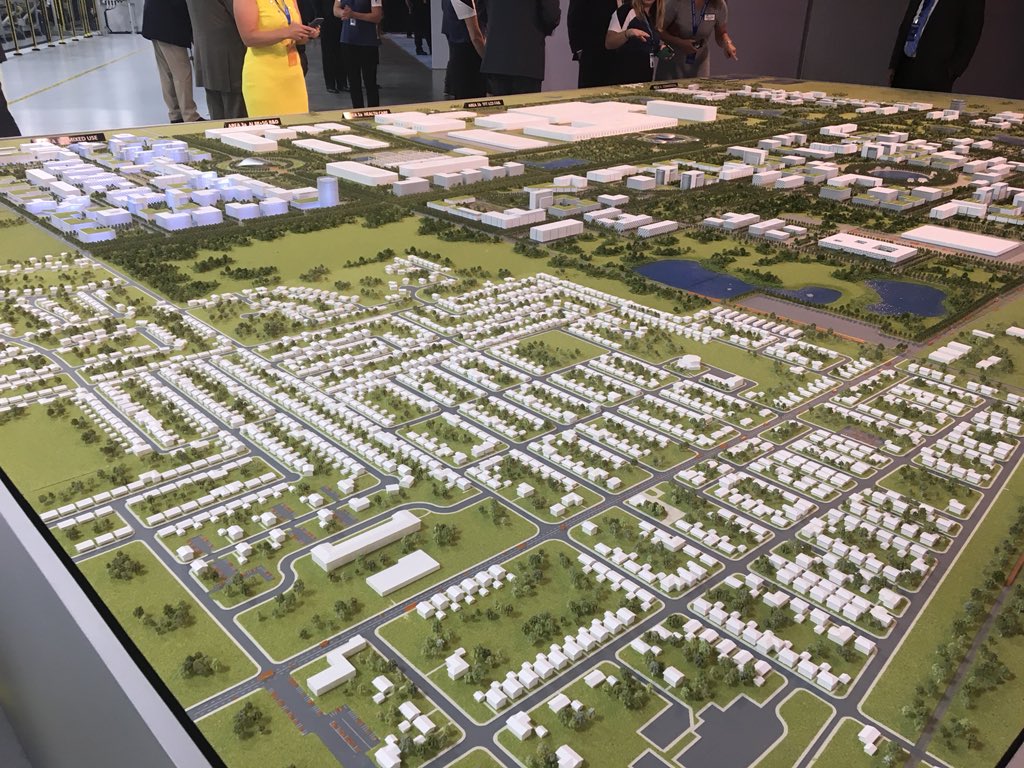Did Business Leaders Fail on Foxconn?
None raised any doubts about a deal that always seemed suspect.
When Gov. Scott Walker first announced his massively expensive deal with Foxconn, the response from business leaders was all positive. Very positive.
“It’s the largest jobs announcement in U.S. history,” Pat O’Brien, executive director of the Milwaukee Seven declared. “We’re really excited about the opportunity for the future.”
Tim Sheehy, President of the Metropolitan Milwaukee Chamber of Commerce, predicted the deal would “transform our economy with an investment in one of the best digital technology players in the world.”
And at the ground breaking for the project in June, 2018, Wisconsin Manufacturers & Commerce President & CEO Kurt R. Bauer gushed that “Foxconn’s new facility is a historic win for Wisconsin, and will provide economic benefits for decades to come. Our state has always been known as a manufacturing and agricultural powerhouse, but thanks to Foxconn, the world now knows we are a hub for high-tech industry.”
State Sen. Tim Carpenter (D-Milwaukee) says business leaders were “over optimistic” and “followed blindly along with Walker to present a unified front.”
“I understand the need to create jobs,” he adds, “but you can’t be blind to all the things in the deal that seemed such a reach.”
There were many reasons to be suspicious of Foxconn. This was a company with a documented record of creating factories with dreadful conditions, that exploited workers and created massive pollution problems — and a reputation for walking out on deals after making extravagant promises that never materialized.
And what Foxconn was proposing to do had never been done. As Willy Shih, an economist at the Harvard Business School, has written, no one has ever attempted to build liquid crystal display fabrication plants outside East Asia.
“All the other significant LCD fabs in the world are located in two time zones in East Asia — there is nothing of the kind in the U.S,” he wrote. “Additionally, all of the production tools will come from Japan, and the people who know how to install and use them are all in those same two time zones.”
As difficult as an LCD fabrication plant would be in the U.S., the challenges are multiplied if it’s a Gen 10.5 plant, which Foxconn promised Walker. These factories transform giant, garage-door-sized sheets of glass (9.6 feet by 11 feet) in order to produce six 75-inch TV screens at once. “The glass is fragile, so most factories in Asia have a glass factory across the street, with the glass sheets fed via an underground tunnel,” Shih writes.
Foxconn would have needed a glass-maker like Corning to co-locate on its Racine campus, but the company later declined to so without its own huge state subsidy, which would have driven the historically high per-job costs of the project even higher.
Then there was the fact that Foxconn was known to favor using robots rather than humans in manufacturing whenever possible, yet was promising 13,000 jobs — and at an average wage of $53,000, which bore no relation to the low-ball wages paid in its Chinese factories.
These were all business questions revolving around the kind of manufacturing plant Foxconn proposed, and yet no business leaders seemed for foresee any problems on the horizon.
Nor did Mark WEDC Chief Executive Officer Mark Hogan see any need to check out Foxconn’s history and track record. As he told Bloomberg, “We didn’t spend a lot of time on that because, in the end, we got to know these people so well.”
Nor did the 17 board members of the Wisconsin Economic Development Corporation, many of whom were current or retired business people, raise any questions.
Carpenter, who served as a board member, says questions were not welcome by the board’s leadership. “I was at every meeting and there was no opportunity for anyone who had any concerns about the deal to have them addressed. This was a deal 50 times larger than anything in state history and they just blew by all the stop signs.”
To help beat down objections to the deal, Sheehy and the MMAC released a report making the remarkable claim that every dollar of state subsidy for Foxconn would return $18 in economic impact in Wisconsin. The study relied, among other research, on a Baker Tilly report done for the WEDC, which estimated that 100 percent of the employees hired to construct the Foxconn plant and work for the company would be from Wisconsin; Baker Tilly, however, had originally estimated that just 40-50 percent of all such workers would be from Wisconsin and then revised its study for the WEDC, as Lawrence Tabak reported in the American Prospect.
Urban Milwaukee had no response to requests for comments from the WEDC and Milwaukee Seven. Sheehy did respond. He continues to believe the Foxconn deal was a historic opportunity for the state. “The rationale is that Wisconsin had a sound package to take a risk on attracting a leading digital manufacturing player. One that could invest in research and design with area universities. That could drive new talent to the region, while making a play in venture funding. To do something outside of our scope, yet connected to our assets. The downside was protected by a contract that would only pay out for substantial capital investment and payroll. The results will take time to assess.”
From the day the deal was first announced, experts on technology warned that Foxconn was part of a fast-changing, brutally competitive industry where any plans by the company could quickly become outdated. That is precisely what has happened.
Whatever the final price tag for Foxconn, the other issue is the “opportunity costs,” the potential loss from how the taxpayers’ money could have been spent. America’s high tech industries are closely connected to top universities and thriving urban areas, something the Walker administration starved while championing the largest subsidy of a foreign company ever done by an American government.
To Shih, who grew up in Wisconsin, the state would have been better off trying to attract industries already known to be competitive in Wisconsin, such as industrial automation or medical technologies. “With $4 billion you could have done a lot,” he told the Journal Sentinel.
Carpenter points to the bio-tech industry in Madison, the water technology cluster in Milwaukee, and the need to grow start-up companies in Wisconsin. “There are so many other things that could have had a bigger impact in Wisconsin.”
If you think stories like this are important, become a member of Urban Milwaukee and help support real independent journalism. Plus you get some cool added benefits, all detailed here.
More about the Foxconn Facility
- Foxconn Paid Mount Pleasant $15 Million Make-Up Fee in 2025 - Steph Conquest-Ware - Jan 6th, 2026
- Murphy’s Law: Total Cost of Foxconn Is Rising - Bruce Murphy - Dec 8th, 2025
- WEDC, Foxconn announce additional $569 million investment in Racine County - Wisconsin Economic Development Corporation - Nov 25th, 2025
- Foxconn Acquires 20 More Acres in Mount Pleasant, But For What? - Joe Schulz - Jan 7th, 2025
- Murphy’s Law: What Are Foxconn’s Employees Doing? - Bruce Murphy - Dec 17th, 2024
- With 1,114 Employees, Foxconn Earns $9 Million in Tax Credits - Joe Schulz - Dec 13th, 2024
- Mount Pleasant, Racine in Legal Battle Over Water After Foxconn Failure - Evan Casey - Sep 18th, 2024
- Biden Hails ‘Transformative’ Microsoft Project in Mount Pleasant - Sophie Bolich - May 8th, 2024
- Microsoft’s Wisconsin Data Center Now A $3.3 Billion Project - Jeramey Jannene - May 8th, 2024
- We Energies Will Spend $335 Million on Microsoft Development - Evan Casey - Mar 6th, 2024
Read more about Foxconn Facility here
Murphy's Law
-
Top Health Care Exec Paid $25.7 Million
 Dec 16th, 2025 by Bruce Murphy
Dec 16th, 2025 by Bruce Murphy
-
Milwaukee Mayor’s Power in Decline?
 Dec 10th, 2025 by Bruce Murphy
Dec 10th, 2025 by Bruce Murphy
-
Total Cost of Foxconn Is Rising
 Dec 8th, 2025 by Bruce Murphy
Dec 8th, 2025 by Bruce Murphy





















Never underestimate the power of magical thinking. It’s the whole basis of trickle down economics.
Please stop listing Tim Sheehy as a “business leader.” He is a far right political leader. If his paycheck came from the Republican Party, the Bradley Foundation, or the Kochs’ Americans for Prosperity,” he would do nothing different during his day than he does now.
Our Wisconsin Republican leaders got conned. Trump too. Of course, Republican leaders are blaming our new Democratic Governor of 2 months, Tony Evers, for the failure of the deal. The Party that tells the poorest of the poor to take responsibility for their decisions blames Evers for their poor decision on Foxconn. Republican leaders: you own this fiasco.